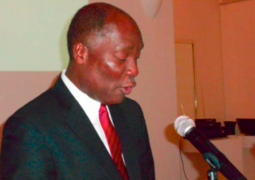(Issue, Friday 27 March 2015)
State prosecutors yesterday told the High Court before Justice Abi, in the trial of former Gambian diplomat Ousman Badjie, that a no-case-to-answer submission “is not admissible under the economic crime Act”.
The state represented by A.M. Yusuph told the court that the accused was charged with five counts of economic crimes and negligence.
He said section 3 of the economic crime Act stated that, in economic crime cases, the court shall hear all evidence of both parties.
Yusuph added that after the close of the prosecution case, the defence opted for a no-case-to-answer submission, adding that section 166 of the Criminal Procedure Code captured the no-case-to-answer submission.
However, it applies to only proceedings of the subordinate courts, he further submitted, adding that the court cannot, therefore, entertain a no-case-to-answer submission because under the economic crime Act the application might still be “incompetent”.
He said the defence counsel did not cite any section that he relied on when making his submission.
“I am urging the court to overrule the defence’s no-case-to-answer submission and call on the accused to enter into defence,” he said.
The state prosecutor added that even if the prosecution did not reply to the no-case-to-answer submission, the court ought to take cognizance of section 3 of the economic crime Act.
Objecting to the submission of the state, defence counsel L.S. Camara told the court that the prosecution’s reply did not amount to replying on the no-case-to-answer submission; rather it was actually an objection to the jurisdiction of the court to hear a no-case-to-answer submission.
Counsel Camara added that an objection to the jurisdiction of the court, to a particular procedure, had to be made before the adoption of that procedure but one could not sit until that procedure was adopted by the court and then raise an objection to it.
He said a prior preliminary objection would have determined whether the court could hear a no-case-to-answer submission, adding that was why it was called a preliminary objection.
The state counsel’s objection was “misconceived” because it came when the submission was already done, Camara added.
The state’s objection on section 3 of the economic crime Act amounted to nothing because the submission had been done already, he said.
He said section 3 of the economic crime Act specifically answers certain sections of the CPC.
On the prosecution’s assertion that he (Camara) did not cite any law, when he was making his no-case-to-answer submission, the defence counsel said a no-case-to-answer submission in the high court is a common law principle, which comes under section 7 of the constitution of The Gambia.
He said that “calling on the accused to enter defence mandatorily is inconsistent with a presumption of innocence and the right to remain silent, and it amounts to asking the accused to prove his innocence”.
Counsel concluded that for a no-case-to-answer submission to be made in economic crime, he would refer to the cases of Mambury Njie, Maimuna Taal, Pa Sallah Jeng, among others, who were all acquitted and discharged on a no-case submission on economic crime at the high court.
The case was adjourned to April 22, for ruling.



